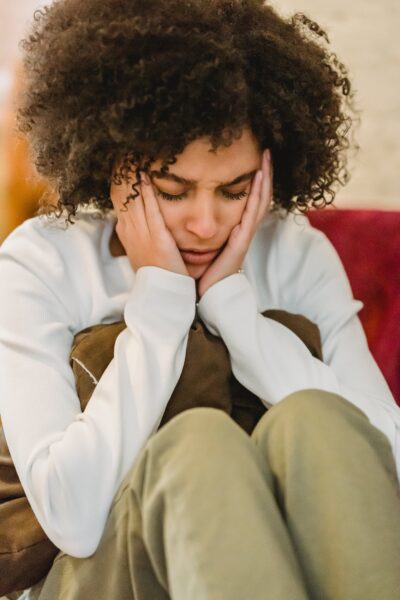
As I lie in in bed at night with the world outside becoming dark, peaceful and quiet, suddenly my mind erupts into a flurry of thoughts. It feels like someone turned the volume up on my worries, each concern suddenly amplified. My thoughts race, making lists of things to do as I worry about uncontrollable factors. I think I should be able to take some deep breaths and settle in, but I end up tossing and turning rather than getting the deep sleep I need. And then, another layer of stress is added as I worry about how my lack of sleep will affect me the next day. Frustrating cycles such as these are common for someone with stress and anxiety.
Unfortunately, stress and anxiety are thriving in our modern world. Our culture manages to continuously bombard all of our senses with stimulation, resulting in an overload of information.[1] All of this stimulation combined with our typical daily stressors can leave us feeling depleted and unable to cope. We are having trouble understanding what we need to react to and what information we can let go of.[2] When we have such overwhelming feelings, we are not able to be at our best. Our feelings of anxiety affect our relationships, our ability to focus on our work, our digestive abilities, and the all-important ability to get a good night’s rest. Thirty-two percent, almost one-third of adults in the United States, reported anxiety and depression symptoms in 2023.[3]Many of us are hoping to find a way to decrease anxiety without resorting to the use of medications. Acupuncture, well- known for its ability to decrease pain and physical symptoms, is also an effective tool to address stress, anxiety and mental health.
At the Acupuncture Clinic of Boulder, we use balancing acupuncture treatments to facilitate the flow of energy in your body so that you can restore a feeling of calmness and regain a sense of control. Balance treatments involve assessing your personal needs, and then activating certain meridians that flow through your body to allow the energy or Qi of your body to move more efficiently. Patients report feeling relaxed during the treatment and better able to cope with stressors following their acupuncture. One patient reports, “Previously, I had many nights when my mind wouldn’t stop turning, my anxiety would increase, and I couldn’t sleep. Getting regular acupuncture has helped decrease the overthinking and I am now sleeping soundly”.
How does acupuncture work to accomplish this? Although the exact mechanisms are still being studied, the following theories show us how acupuncture helps to regulate our nervous system.
- Neurotransmitter Regulation: Acupuncture is believed to influence the release and balance of neurotransmitters such as serotonin, dopamine, and norepinephrine, which are involved in regulating mood and emotions. By modulating these neurotransmitters, acupuncture may help alleviate symptoms of anxiety.
- Stress Response: Acupuncture may help regulate the body’s stress response by reducing the levels of cortisol, a hormone associated with stress. By promoting relaxation and reducing stress hormone levels, acupuncture can help individuals manage anxiety symptoms.
- Regulation of the Autonomic Nervous System: Acupuncture is thought to influence the autonomic nervous system, which controls involuntary bodily functions such as heart rate, digestion, and respiratory rate. By regulating the sympathetic (fight or flight) and parasympathetic (rest and digest) branches of the autonomic nervous system, acupuncture can promote relaxation and reduce anxiety.
- Acupuncture can also alleviate physical symptoms associated with anxiety, such as muscle tension and pain. By targeting specific points associated with pain relief, acupuncture may help alleviate physical discomfort, which in turn can reduce anxiety levels.
- Enhanced well-being: Many individuals report feeling a sense of relaxation, calmness, and well-being during and after acupuncture sessions. This subjective experience of well-being can contribute to overall anxiety reduction.

Several reviews and meta-analyses have proven the positive effect of acupuncture on reducing the state of anxiety. An NIH report quotes the Annals of General Psychiatry: The meta-analysis of anxiety symptoms showed that acupuncture was more effective than the control condition, with a standard mean effect size of − 0.41 (95% CI − 0.50 to − 0.31; p < 0.001), and that acupuncture intervention showed good tolerance and safety in the treatment of anxiety disorders.[4]
Sometimes life throws us curve balls we cannot change; what we can change, is our reaction to the circumstance both emotionally and physiologically. Acupuncture is a promising technique to alleviate anxiety and promote overall well-being. It can be safely used in conjunction with western treatment or on it’s own. By promoting energy flow and equilibrium, acupuncture encourages the body’s innate ability to self-regulate, providing a complementary option for individuals seeking relief from anxiety.
[1] https://www.forbes.com/health/mind/anxiety-statistics/
[2] https://www.forbes.com/health/mind/anxiety-statistics/
[3] U.S. Census Bureau’s Household Pulse Survey
[4] https://www.ncbi.nlm.nih.gov/pmc/articles/PMC7847562/
Written by Barb Jones, edited by Erin Pass



